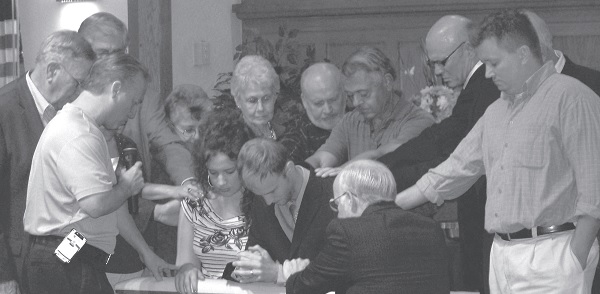Caring for pastors to stay in peace
【Church】

▲A pastor’s peaceful and stable retirement life begins with pre-planning in cooperation with the church. (Image source: http://ecx.images-amazon.com/images/I/91WbaevJXkL.jpg)
Being unable to retreat is not a good thing
Everyone will retire from their job at some point, and pastors are no exception. Preaching the gospel is the lifelong mission of the children of the Kingdom of God, but "there is a time for everything." The responsibility of pastoring the church is very heavy. If you are old and have to work hard to shoulder the pastoral responsibility, you cannot step back. This is not a sign of treating the pastor well. We brothers and sisters cannot simply insist that pastors should not retire from their ministry just by saying, "Preaching is a lifelong calling."
Modern people have longer life spans. If a pastor is in good physical, mental and spiritual health, it is not surprising that he can serve until he is seventy or even eighty years old, depending on the pastor's own situation. However, ministry does not necessarily mean pastoring the church. After retiring from the pastorate, one can also serve as a freelance or part-time preacher, an "acting pastor", a consultant or a co-worker of a gospel organization during the window period when the church is looking for a new pastor. , or text service, etc.
The pressure of these jobs is lighter than that of a full-time pastor. In addition to reducing stress and enjoying more of your old age, it is really a good thing to give young successors opportunities to remind, help and cultivate elite soldiers for the Kingdom of God in a timely manner!
Should you retreat or not, or you may have difficulties
Of course, there are also older pastors who should not retreat, citing Caleb’s famous saying, “As my strength was then, so it is now” (refer to Joshua 14:11), and are unwilling to step back from being senior pastors (or even is the founding pastor) resigned from his post. In order to protect their position, they may have to win over church leaders on the one hand, and suppress young pastors on the other hand, which invisibly creates an unhealthy culture in the church.
There may be several reasons why older pastors are reluctant to retire from the pastoral position - they are afraid of losing the love of the congregation, they are worried about problems with their successors, they are unwilling to lower their authority, they are worried about financial problems after retirement, etc. In particular, the author provides some opinions on the last item, "Pastor's Retirement Financial Planning."

▲It is really a beautiful thing for pastors to give opportunities to young successors, remind them at the right time to help them, and cultivate elite soldiers for the kingdom of God!
(Image source: http://lookstluke.files.wordpress.com/2011/11/ben-installation-5a.jpg)
Economic situation varies from person to person
Every family's situation is different, and families of retired pastors certainly have financial needs. In recent years, more and more believers who have been professionally engaged in the workplace for many years are called to put aside their majors after middle age, study theology and then serve in the pastoral ministry. They may already have considerable financial capabilities, including retirement savings and social security pensions, and have paid off their own mortgage, so their financial situation after retirement will not be a problem. Another type of pastoral family has no worries after retirement because the teacher's wife has been engaged in a professional job with a higher salary for a long time.
But what about pastors who have been pastoring churches for many years (especially those who have been serving in small and medium-sized churches for a long time)? If the pastor and his wife serve together and do not work outside the home, the pastor must make arrangements for his post-retirement life needs as early as possible. I believe that most Chinese church pastors fall into this category.
Who is responsible for making preparations in advance?
First, let’s introduce the history and current status of social retirement financial planning in the United States.
Before 1950, the main employers in the United States were the government and large commercial organizations. Many Americans worked for the same organization throughout their lives. The organization usually provided them with stable retirement benefits, allowing them to enjoy monthly pensions of an amount for life after retiring at a certain age. Depending on work income and length of service, this pension system is called a DB plan (Defined Benefit Plan). In 1935, the United States began to implement the "Social Security" system, with employees paying social security taxes, allowing most families who have worked for at least ten years to enjoy pension benefits for life. These two kinds of retirement benefits have become the retirement income that most Americans rely on in the last century.
However, after 1950, the average life expectancy of Americans increased rapidly from 47.3 years in 1900 to 75.4 years in 1990. Large organizations found that DB retirement plans were too expensive, and some organizations were in financial crisis, so retirement plans were provided by the government. Under a takeover, employees would only receive a small portion of their pensions.
At this time, another plan called DC (Defined Contribution Plan) became popular. It was originally mainly for employers to save retirement funds for employees, but the 1978 tax law allowed employers to provide 401(K) retirement savings plans. After the war, the DC plan began to mainly involve employees depositing retirement funds from their own salaries, and the government would provide tax incentives as an incentive; even if the employer participated, it would only be a symbolic contribution (Employer Matching). So far, Americans' retirement savings model has shifted from DB plans arranged by employers to DC plans in which employees save their own savings.
The retirement savings plans of mainstream churches in the United States have roughly the same evolution as the above-mentioned systems. Currently, a few mainstream denominations (Catholic, Methodist, etc.) still provide DB plans, that is, pastors enjoy pensions after retirement, plus social security retirement gold. However, most churches do not have DB plans, but use DC plans, mainly 401(K) and 403(B), also known as TSA Savings Plan (Tax-Sheltered Annuity). The former was originally reserved for commercial institutions, while the latter was used by schools, non-profits and churches, but in recent years tax laws have essentially eliminated both. It means there is no difference between the two.
Since Social Security retirement benefits are generally not enough to live on, most pastors should try their best to use 401(K) or 403(B) savings plans to prepare for future retirement.

▲If pastors plan their finances early, they will not hesitate when it’s time to retire. (Image source: http://backtoglory.com/wp-content/uploads/2013/08/retirement.jpg)
Setting up a plan is easy
Whether it is a DB or DC plan, it must be established by the church so that pastors can have the opportunity to enjoy it. I have come across many small Chinese churches that do not have a savings plan for their pastors. This is a pity.
The procedure for setting up a savings plan such as a 403(B) is very simple. You can go to a brokerage firm such as Schwab or Fidelity to set up a plan. After that, the church does not need to declare to the government every year. In addition to commercial brokerage firms, GuideStone, an agency affiliated with the Southern Baptist Convention, has in recent years begun to provide retirement savings plan services to churches other than Baptist churches.
If the church does not set up a DC plan, the pastor can only set up an Individual Retirement Account (IRA) on his own. However, this kind of individual retirement account can only deposit up to US$5,500 per year (the maximum deposit for those aged fifty or above is US$6,500). U.S. dollars), however, you can save $17,500 per year in a 403(B) plan ($23,000 if you are fifty or older).
In order to encourage and help pastors save for retirement, churches should consider depositing some funds for pastors. The church can make a decision based on its own financial situation, and the decision can be revised every year. The amount of money deposited by the church is not within the above maximum amount.
Retirement savings with huge tax advantages
The DC retirement savings plan mentioned above, in addition to allowing pastors to make early financial arrangements for future retirement, also brings two important tax benefits to pastors that year:
1. Pastors can help reduce income taxes by deducting the amount deposited in the DC plan from their income and not including it in the total income when filing taxes. This tax benefit may not be of much benefit to pastors with low salaries, but they can use the "housing allowance" to reduce their income taxes.
2. The amount deposited in a DC plan is exempt from self-employment tax. Pastors all know that unless they apply for "Self-Employment Tax Exemption" (Form 4361 Exemption), the largest tax a pastor pays each year is not income tax, but self-employment tax, which is approximately 15% of income (including housing allowance). Amounts deposited into a DC retirement savings plan are not subject to self-employment tax. Please note: This discount does not apply to amounts deposited into an Individual Retirement Account (IRA).

▲Self-employment tax is approximately 15% of income (including housing allowance). Some churches sympathize with the heavy tax burden of pastoral staff and reimburse half of the self-employment tax. This is an appropriate caring approach. (Image source: http://psgcnjnewsletter.files.wordpress.com/2012/07/78934-actorstaxes.jpg)
Discuss candidly and seek help
If the church has not set up a DC plan, the pastor should propose it to the church and do not be afraid of being criticized by members, because most of the members themselves already enjoy the DC plan. However, some church leaders are mostly retired elders. They don’t know much about retirement savings plans, or they don’t agree with pastors’ requirements for churches to set up retirement plans. When encountering this kind of difficult situation, it is recommended that pastors contact the author (money@cchc.org), and the author will communicate with the church leaders. Many times they do not support it because they do not understand the tax regulations or do not know where to start.
Some American churches provide pastors with comprehensive retirement savings plans and help pastors choose investment projects within the savings plans. However, this is rare in Chinese churches. Even if the church has set up a DC plan for pastors, It will not provide investment assistance to pastors. Pastors should also seek professional financial advisors for assistance in this regard. Pastors need to work with the church and have the right information to properly arrange their own and their family's retirement finances. Pastors should not be afraid to make reasonable demands for themselves. Church brothers and sisters should also care for pastors so that pastors can enjoy a stable old age.
 Author profile
Author profile
Lin Xiuying, a former banker, retired early at the age of 45. After that, he volunteered to serve the church and pastors through financial management, and used financial management as a tool to help the community and spread the gospel. Currently, he is the volunteer leader of the Northern California Horn Evangelistic Association; the founder of the "Bread of Life" gospel enterprise; and the editor-in-chief of the Northwest Edition of the "Clarion" monthly newspaper. His book "Love in the World" has been published in its thirteenth edition. The following is Brother Lin’s financial management newsletter website specially designed for pastoral colleagues. Welcome to read: http://www.moneyradio.org/showSubCategory.php?SCID=2816
